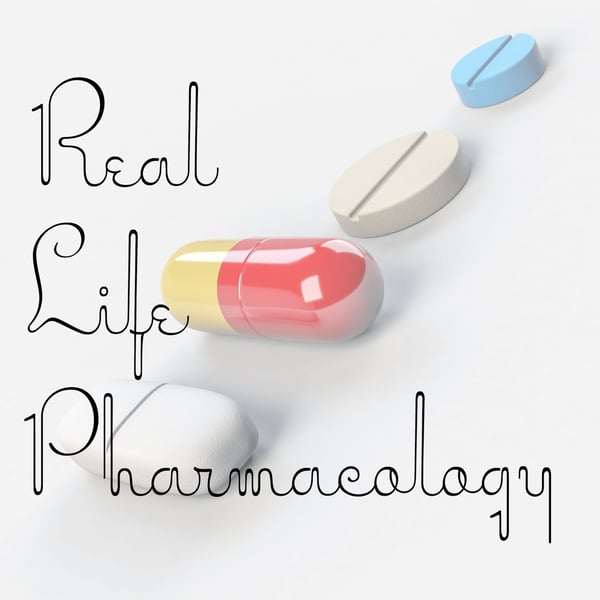Aliskiren Pharmacology Podcast
Real Life Pharmacology - Pharmacology Education for Health Care Professionals
Eric Christianson, PharmD; Pharmacology Expert and Clinical Pharmacist
5 • 716 Ratings
🗓️ 26 October 2023
⏱️ 11 minutes
🧾️ Download transcript
Summary
Aliskiren should not be used with ACE Inhibitors or ARBs. I discuss why that is in this episode.
Aliskiren has a long enough half-life at approximately 24 hours so it is recommended to only take this once daily.
Hyperkalemia is a major concern with aliskiren. It is important to monitor potassium levels and renal function.
Transcript
Click on a timestamp to play from that location
| 0:00.0 | Hey all, welcome back to the Real Life Pharmacology podcast. I'm your host, pharmacist, Eric Christensen. |
| 0:06.1 | Thank you so much for listening today. As always, go get your free 31-page PDF on the top 200 drugs. |
| 0:13.5 | It's a great study guide, great refresher, if you're out in clinical practice. So simply going to real life pharmacology.com. |
| 0:21.9 | An email will get you access to that. We also get you email updates when we've got new |
| 0:27.1 | podcasts and other content available as well. So go do that, sign up for that free 31 page |
| 0:33.9 | PDF at real life pharmacology.com. |
| 0:42.6 | Let's get into the drug of the day today, and that is Alaskeran. |
| 0:46.2 | Brand name of this medication is Tecterna, |
| 0:51.7 | and this medication is classified as an anti-hypertensive, |
| 0:53.3 | so it's going to lower blood pressure, |
| 0:56.1 | and it's also classified as a renin inhibitor. So if you think about the renin angiotensin-elodosterone system, you'll recognize |
| 1:06.3 | that Alaskirin being a renin inhibitor is also going to work on that pathway. |
| 1:14.0 | So mechanistically, by this drug, essentially reducing the activity of renin, |
| 1:21.0 | that's going to ultimately block the conversion of angiotensinogen to angiotensin 1, and then so on and so forth. |
| 1:30.3 | So because of that blocking, that's going to ultimately lead to a reduction in blood pressure |
| 1:40.7 | due to vasodilation. Remember, angiotensin 2 is the most potent vasoconstrictor, |
| 1:47.8 | and that's further down that line in that cascade of the formation of different metabolites |
| 1:53.6 | of inalterations to angiotensinogen and angiotensin 1. So again, reducing that reenactivity ultimately blocks that conversion of angiotensin |
| 2:04.5 | gen to angiotensin 1, which is in that pathway of increasing angiotensin 2. So going to lead to |
| 2:11.6 | vasodilation and obviously lowering of blood pressure. This medication is typically dosed once a day, so that is definitely an advantage. |
| 2:21.2 | And this medication is typically more expensive than your traditional ACE inhibitors and |
| 2:27.4 | arms and things of that nature, which lends to an important education point. |
... |
Please login to see the full transcript.
Disclaimer: The podcast and artwork embedded on this page are from Eric Christianson, PharmD; Pharmacology Expert and Clinical Pharmacist, and are the property of its owner and not affiliated with or endorsed by Tapesearch.
Generated transcripts are the property of Eric Christianson, PharmD; Pharmacology Expert and Clinical Pharmacist and are distributed freely under the Fair Use doctrine. Transcripts generated by Tapesearch are not guaranteed to be accurate.
Copyright © Tapesearch 2025.

